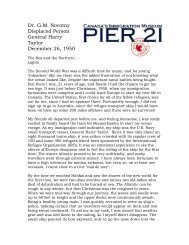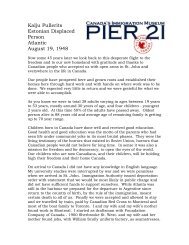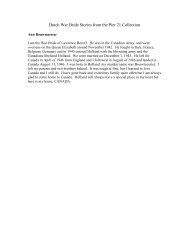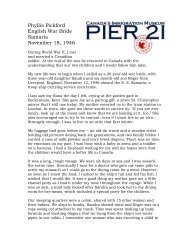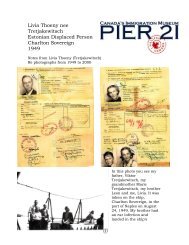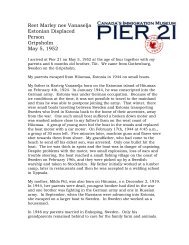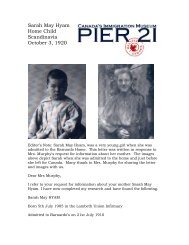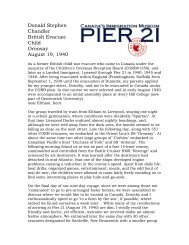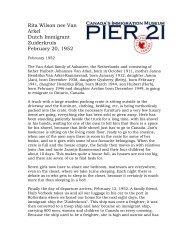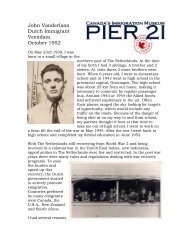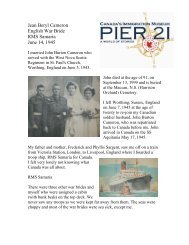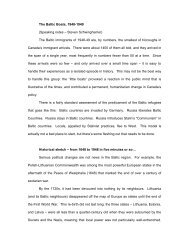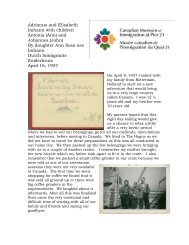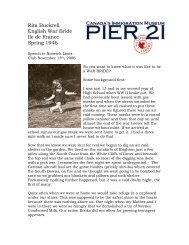Dutch and German Immigrants The Prins Family - Pier 21
Dutch and German Immigrants The Prins Family - Pier 21
Dutch and German Immigrants The Prins Family - Pier 21
You also want an ePaper? Increase the reach of your titles
YUMPU automatically turns print PDFs into web optimized ePapers that Google loves.
watched your shin bones. We always played before school started <strong>and</strong>during recess. Later, this school became the post office <strong>and</strong> some timeafter I left for Canada it was demolished. Presently there is now a newhome for retired people where Uncle Phil <strong>and</strong> Aunt Lena now live. This isthe same street where I used to live; the Houtmanstraat.<strong>The</strong> <strong>German</strong> army was building trenches quite close to where we wereliving <strong>and</strong> they had a huge barn there where thy stalled their horses(never mind the 'mechanization' of the Wehrmacht!). Most of thesehorses were requisitioned from the <strong>Dutch</strong> farmers.In the beginning of the war live mainly went on as usual, but more <strong>and</strong>more changes <strong>and</strong> restrictions were imposed upon us as the warprogressed. Of course this is all seen through the eyes of a twelve-yearold boy. In the movies about the war, you quite often see rifle-totingsoldiers at every corner of the street. This, I definitely don’t remember.Later on when the underground resistance came into being, they hadmore to fear from the Gestapo, Sicherheidsdienst <strong>and</strong> <strong>Dutch</strong> informers.(A <strong>German</strong> you usually would recognize him by his accent; a <strong>Dutch</strong>informer you wouldn’t). <strong>The</strong> underground resistance groups aided Jewswho faced deportation to the concentration camps <strong>and</strong> other personswho refused to go <strong>and</strong> work in the <strong>German</strong> factories with hiding places<strong>and</strong> rationing cards. As he war progressed more <strong>and</strong> more food rationingcame into effect.All the news on the <strong>Dutch</strong> radio stations was censored of course by the<strong>German</strong> authorities, but people tried to listen to the BBC stations fromEngl<strong>and</strong> but this was illegal <strong>and</strong> the stations were 'jammed' <strong>and</strong> it wasimpossible to get a clear sound. Later on, all the radios were to beh<strong>and</strong>ed in but not everybody did, so the underground press had stillaccess to radio Oranje in Engl<strong>and</strong>.By the end of 1942 half of the town of IJmuiden was being evacuatedbecause the <strong>German</strong>s needed room to build their 'Atlantic Wall. Nonessential<strong>and</strong> older people were moved to Friesl<strong>and</strong> in the northern partof Holl<strong>and</strong> <strong>and</strong> considering what followed in the 1944 'hunger winter'those people were relatively well off. Opa <strong>and</strong> Oma <strong>Prins</strong> moved acrossthe North Sea canal to the Geelvinkstraat because Uncle Cor, who wasstill living at home, worked at the Hoogovens Steel Works. <strong>The</strong>y livedthere for year <strong>and</strong> a half <strong>and</strong> then they had to move again.During this time the underground resistance assassinated a policemanwho collaborated with the <strong>German</strong>s; he lived in the same neighbourhoodas my gr<strong>and</strong>parents. <strong>The</strong> <strong>German</strong>s retaliated by conducting a 'razzia'(door to door roundup of people). Young men found would be deported to<strong>German</strong>y. <strong>The</strong>y were just having breakfast at Oma’s house <strong>and</strong> Uncle



